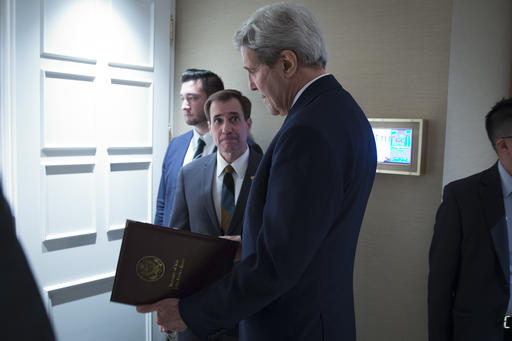-
Tips for becoming a good boxer - November 6, 2020
-
7 expert tips for making your hens night a memorable one - November 6, 2020
-
5 reasons to host your Christmas party on a cruise boat - November 6, 2020
-
What to do when you’re charged with a crime - November 6, 2020
-
Should you get one or multiple dogs? Here’s all you need to know - November 3, 2020
-
A Guide: How to Build Your Very Own Magic Mirror - February 14, 2019
-
Our Top Inspirational Baseball Stars - November 24, 2018
-
Five Tech Tools That Will Help You Turn Your Blog into a Business - November 24, 2018
-
How to Indulge on Vacation without Expanding Your Waist - November 9, 2018
-
5 Strategies for Businesses to Appeal to Today’s Increasingly Mobile-Crazed Customers - November 9, 2018
United States says $400M payment was contingent on release of prisoners
In this October 23, 2015 file-pool photo, Secretary of State John Kerry, speaks to senior adviser John Kirby before a news conference in Vienna. Further, President Obama never disclosed the $400 million cash payment, which was exchanged by the Swiss government to allude prohibitions in USA law to transfer such payments to Iran, when he announced the Iran nuclear deal on January 17.
Advertisement
The same day that the money was delivered, Iran freed three United States citizens, including Washington Post reporter Jason Rezaian.
He also said that due to concerns Iran might renege on the prisoner release, as well as “mutual mistrust” between the two countries, “we of course sought to retain maximum leverage until after American citizens were released”.
It is the first time the US has so clearly linked the two events, which critics have painted as a hostage-ransom arrangement.
State Department spokesman John Kirby repeated the administration’s line that the negotiations to return the Iranian money – from a military-equipment deal with the US -backed shah in the 1970s – were conducted separately from the talks to free four USA citizens in Iran.
The official said a $1.7 billion settlement was for “military sales to Iran that they made payment for, and we didn’t make delivery of the military equipment” as Iran “was seeking billions of dollars on this claim, and these kinds of complex litigation are very unpredictable, and our lawyers assessed that we could have faced a significantly higher judgment”.
“We took advantage of that to make sure we had the maximum leverage possible to get our people out and get them out safely”, Kirby added.
The payment coincided with the release of Marine veteran Amir Hekmati, seized in August 2011; Washington Post reporter Jason Rezaian, seized in July 2014; Idaho pastor Saeed Abedini, convicted in January 2013 of establishing house churches; Matthew Trevithick, a US student detained last November; and Nosratollah Khosravi-Roodsari, seized in May 2015 after reportedly claiming that he knew the whereabouts of Bob Levinson, a former Federal Bureau of Investigation agent kidnapped in March 2007. “That was our top priority”.
The White House announced on January 17 it was releasing $400 million in funds frozen since 1981, plus $1.3 billion in interest owed to Iran, as part of a settlement of a long-standing Iranian claim at the Iran-U.S. Claims Tribunal in The Hague.
Trump spokesman Jason Miller sought to blame Democratic rival Hillary Clinton for the payment, even though it happened nearly three years after she departed as secretary of state.
The White House originally pushed back on a Wall Street Journal report claiming the US essentially paid a ransom to Iran, which is against longstanding USA policy.
The shipment, on pallets loaded with Euros, Swiss Franks and other currency, was loaded onto an Iranian cargo plane in Geneva, Switzerland, but not allowed to depart for Iran until a Swiss Air Force craft with the Americans on board was allowed to depart from Tehran, the Journal reported. The fourth American left on a commercial flight.
Earlier this month, after the revelation the USA delivered the money in pallets of cash, the administration flatly denied any connection between the payment and the prisoners.
“Reports of link between prisoner release & payment to Iran are completely false”, Kirby tweeted at the time.
The funds were part of a trust fund Iran used before its 1979 Islamic Revolution to buy USA military equipment that was tied up for decades in litigation at the tribunal.
He reiterated, “remember, it’s it was their United States dollars 400 million that had been awarded to them by The Hague Tribunal, so let’s make that clear”.
The Iranians wanted money they were owed, but the US only released the money after the detainees were released, she said.
The ordeal has set off a tidal wave of condemnation from Republicans, who have questioned the timing of the two events and said the government paid ransom for the prisoner release.
House and Senate Republicans have peppered the administration for more details about the transaction. “If it quacks like a duck, it’s a duck”.
President Obama denied on August 4 that the payment was tied to the detainees’ release, saying the money was the first installment of the lifting of sanctions called for by the 2015 nuclear agreement with Iran.
Sen. Dianne Feinstein, D-Calif., said critics are making political hay of the matter, when in fact American officials showed good judgement.
Kirby said the State Department will work with the National Archives and Record Administration to determine whether there need to be changes to the department’s record-keeping practices.
The House Financial Services Committee hasn’t yet decided whether to hold hearings.
Advertisement
Congress returns from a lengthy recess after Labor Day.





























